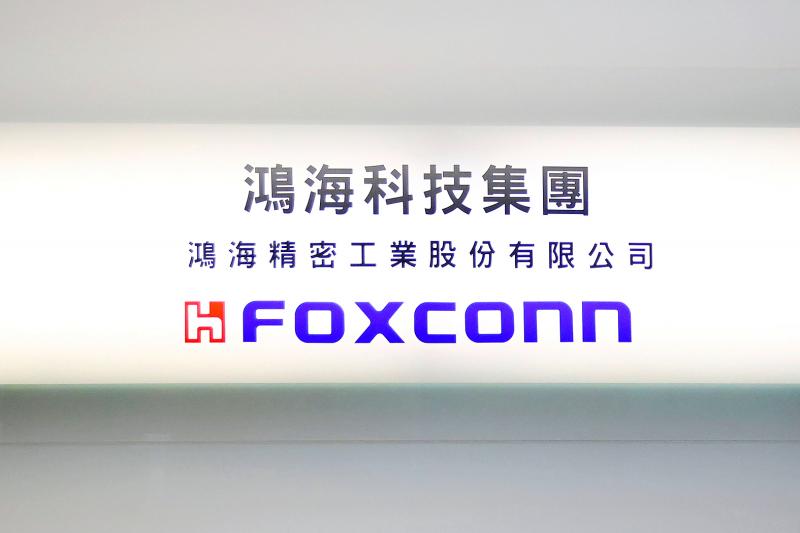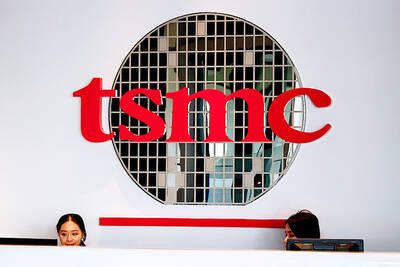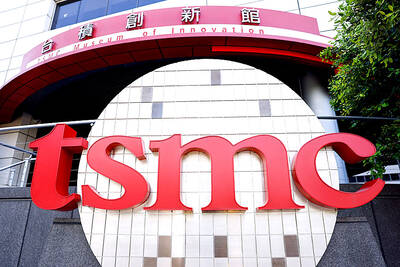Hon Hai Precision Industry Co (鴻海精密) has been focused on securing critical standard 5G patents to boost its competitiveness in the field, company chairman Liu Young-way (劉揚偉) said on Wednesday.
The company has also started research and development of 6G chips to stay ahead of the game in emerging technologies, Liu told a smart industry development forum in Taipei.
Hon Hai, the world’s largest contract electronics manufacturer, has secured 1,465 standard 5G patents so far, making it the ninth-largest standard 5G patent holder in the world.

.Photo: Reuters
Also known as Foxconn in the global market, the company envisions that 5G technologies would not only change people’s way of life, but also create tremendous business opportunities in the electronics sector, Liu said.
Since 2018, 5G technologies have been meeting the need for new communications applications in a growing global population, he said.
However, along with the introduction of new technologies, the global supply chain is becoming increasingly complicated, Liu said.
Against that backdrop, Hon Hai is working to expand its product portfolio with software, processors and computing devices for new communications technologies, he said.
The company’s new 5G technologies would include a wide range of applications, such as automotive electronics and smart production, Liu said.
In addition, Hon Hai and its telecom service subsidiary, Asia Pacific Telecom Co (亞太電信), are teaming up with Far EasTone Telecommunications Co (遠傳電信) to develop new communications technologies, including 6G applications and quantum computing, he said.
Quantum computing is expected to improve 5G base stations, while 6G chips are seen as vital to future communications, he said.
Asked about Taiwan’s exclusion from the recently signed Regional Comprehensive Economic Partnership (RCEP), Liu said it was unlikely to affect his company’s business.
Hon Hai has long been mapping out development strategies to extend its reach in the Asia-Pacific, and as the RCEP is a regional agreement, it is in line with the company’s vision, he said.
Commenting on Hon Hai’s share price, Liu said that the stock is undervalued, with a low price-to-book ratio and a price-to-earnings ratio that is lower than its peers, despite its promising future, he said.
The company has in the past few years expanded from hardware manufacturing only into software development to boost its profitability, he said.
In the initial phase of diversification, Hon Hai’s gross margin is expected to increase by 1 percentage point to 7 percent, and when the upgrade is completed, it is forecast to rise to 10 percent by 2025, Liu said.
Hon Hai shares yesterday closed 1.22 percent higher at NT$83 in Taipei trading, outpacing the TAIEX, which rose 0.78 percent to 13,845.66.
Since the beginning of the year, Hon Hai shares have dropped by 8.6 percent, while the broader market has gained about 15 percent.

Chizuko Kimura has become the first female sushi chef in the world to win a Michelin star, fulfilling a promise she made to her dying husband to continue his legacy. The 54-year-old Japanese chef regained the Michelin star her late husband, Shunei Kimura, won three years ago for their Sushi Shunei restaurant in Paris. For Shunei Kimura, the star was a dream come true. However, the joy was short-lived. He died from cancer just three months later in June 2022. He was 65. The following year, the restaurant in the heart of Montmartre lost its star rating. Chizuko Kimura insisted that the new star is still down

While China’s leaders use their economic and political might to fight US President Donald Trump’s trade war “to the end,” its army of social media soldiers are embarking on a more humorous campaign online. Trump’s tariff blitz has seen Washington and Beijing impose eye-watering duties on imports from the other, fanning a standoff between the economic superpowers that has sparked global recession fears and sent markets into a tailspin. Trump says his policy is a response to years of being “ripped off” by other countries and aims to bring manufacturing to the US, forcing companies to employ US workers. However, China’s online warriors

Taiwan Semiconductor Manufacturing Co (TSMC, 台積電) listed the challenges of ensuring export control compliance by its customers, months after the company’s artificial intelligence (AI) silicon was found to have flowed to US-sanctioned Huawei Technologies Co (華為) via intermediaries. “TSMC’s role in the semiconductor supply chain inherently limits its visibility and information available to it regarding the downstream use or user of final products that incorporate semiconductors manufactured by it,” the Hsinchu-based company said in its latest annual report released on Friday. The world’s largest contract chipmaker said the constraint impedes its ability to prevent unintended end-uses of its semiconductors, as well

Taiwan Semiconductor Manufacturing Co (TSMC, 台積電) expects steady growth this year despite global economic uncertainty due to continued momentum from tech trends such as 5G, artificial intelligence (AI) and high-performance computing (HPC) applications. In the company’s annual shareholders’ report released on Thursday, TSMC chairman and CEO C.C. Wei (魏哲家) said the company is well-positioned to meet market demand with its differentiated technology platforms. The company’s 2-nanometer process is on track for volume production in the second half of this year, while its next-generation nanosheet-based A16 process, aimed at HPC applications, is scheduled for mass production late next year, Wei said. Advanced technologies —